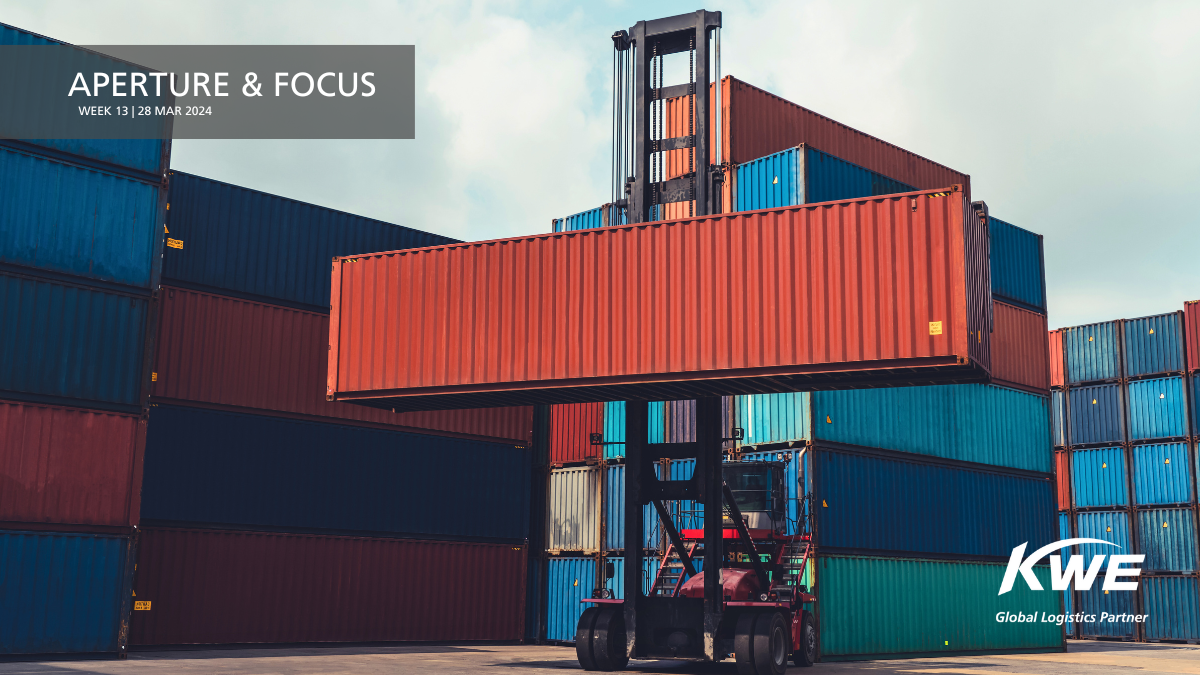Quote
Aperture & Focus 2024: Week 13

Global Aperture
The U.S. Port of Baltimore is grappling with the aftermath of the devastating bridge collapse on March 26th, with efforts shifting from search and rescue to recovery. Investigations are underway, focusing on potential causes of the accident, while the shipping industry faces disruptions and adjustments due to closure of the critical port. East Coast ports, including those in the states of New York, New Jersey, and Virginia, stand ready to accommodate additional ships.
Regional Focus
Americas
United States: Ahead of the April 8th total solar eclipse, several state transportation departments in the Eastern to Midwest regions of the United States are advising truckers to consider alternative routes due to expected severe traffic congestion caused by millions of people traveling to view the event. With up to 3.7 million people anticipated to chase the eclipse's path, transportation officials are implementing safety measures to minimize traffic jams, including urging truckers to plan their routes before or after the eclipse to prevent disruptions to freight movement.
The Port of Virginia has completed a project to widen its ship channel, allowing better access for ultra large container vessels (ULCVs). This enhancement aims to increase efficiency by permitting simultaneous two-way traffic of ULCVs, improving the speed of freight movement through Norfolk Harbor.
Port Houston in Texas experienced robust import performance in February with a 49% month-over-month increase in general cargo imports. Despite challenges such as limited transits through the Panama Canal, Port Houston's containerized trade showed substantial growth, indicating a shift towards ports closer to consumption centers to avoid potential disruptions.
Canada: The International Maritime Organization has approved new environmental protections for the Canadian Arctic. The measures include creating more Emissions Control Areas that require ships to use low-sulfur fuel. The goal of these measures is to align shipping regulations with the Arctic and reduce the carbon emissions that contribute to the melting of Arctic Sea ice.
Asia-Pacific
India: Indian Customs plans to auction abandoned or long-dwelling export containers at Nhava Sheva to clear space and expedite cargo flows. The move aims to prevent congestion at docks with the goal of improving logistics efficiency and reducing storage bottlenecks in one of India's major container ports.
Taiwan: Regular operations of Keelung port were restored on March 21st after a container ship collided with the West Pier 20, causing damage to the pier and the ship's stern. The accident led to emergency repairs on the vessel and an investigation by maritime authorities, affecting port operations temporarily.
Europe, Middle East & Africa
Finland: The Finnish transport workers' strike has been extended to April 1st, causing significant disruptions in the ports of Helsinki, Kotka, Turku, and Rauma. Since the transport workers began striking in protest of labor reforms from the government, they have halted container operations, causing delays in shipping goods to and from Finland. Once the strike concludes, backlogs could take several days to clear, affecting shipping schedules.
Netherlands: With concerns over slot restrictions at Schiphol Airport (AMS) affecting freighter operations, Maastricht Airport (MST) has presented itself as an alternative for air cargo. Although MST is smaller than airports such as Liege, Frankfurt, and Brussels, MST claims to offer customized handling solutions, quick turnaround times, and investments in infrastructure.
Germany: EUROGATE Container Terminal Hamburg (CTH) implemented a digital verification of truck drivers that replaces the previous analogue "trucker card" system. During the spring of 2024, the transition will be implemented across 7 container terminals in Germany to increase efficiency and security.